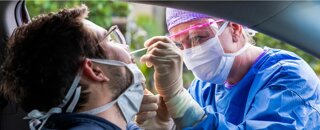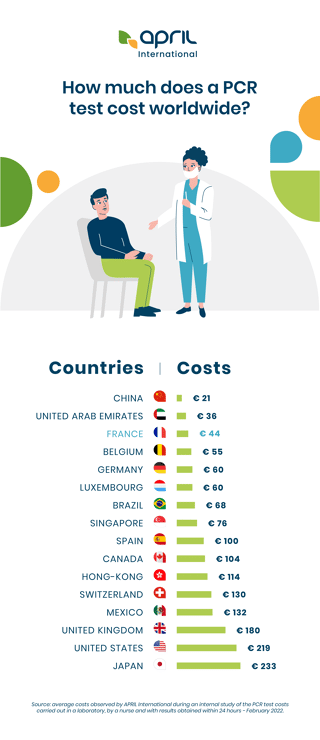- published on 26/08/2021
- 5min
The cost of PCR tests worldwide
At a time when we seem to be entering a third wave of COVID-19, PCR tests have now become commonplace. In France alone, tens of thousands of tests are performed every day, and while for people registered with the French health system the test is free and accessible without a prescription, the same is not true around the world.

What is a PCR test?
An essential element of prevention, the RT-PCR (Reverse Transcription Polymerase Chain Reaction) test is currently the reference test for COVID-19 screening. It can be requested individually in case of suspected infection, but it is also systematically required by more and more countries since the spring of 2020 in order to prevent the importation of the virus. To this end, these countries are requiring travellers to present proof of a recent negative PCR test in order to enter their territory.
The COVID-19 PCR test is based on a sample, or swab, of nasal secretion or saliva; the sample is analysed in a laboratory to detect the presence of the coronavirus genome. It allows for a virological diagnosis during the acute phase of Covid; in other words, it can detect whether the patient is a carrier of the virus at the time of testing, but it does not inform about a possible previous infection.
The time required to obtain the results varies from country to country, and even from city to city, from 24 hours to several days. These differences are due to several factors that come into play: the number of testing laboratories, the influx of demand, the quality of local equipment, access to reagents, etc. All of these factors affect the time required to perform the test, but also the cost.
How much does a PCR test cost abroad?
The cost of PCR tests, as well as the out-of-pocket expenses for those tested, vary greatly from one country to another. Many variables come into play: in some countries, coverage by the social security system applies only under specific conditions (test performed by the public sector, reserved for certain categories of residents, or in case of symptoms only).

The cost in France corresponds to the fee set by French Social Security. This rate can go up to €74 (87 USD) depending on the health professional consulted.
In France, anyone who wants to get a COVID-19 test can get one without prescription, and it is fully covered by Social Security; this, however, is not the case in many other countries.
> Focus: France's health system
In the UK, for example, the PCR test is fully covered by the NHS, but only in specific cases, mainly if you have symptoms. In all other cases (asymptomatic suspicion, contact case, entry into the territory from an at-risk country, overseas departure, etc.), the test can only be done through the private health sector, which is not covered by Social Security and can cost as much as €250 (295 USD).
> Learn more about the healthcare system and the cost of healthcare in the UK
In Singapore, the test is free for all permanent residents and long-term visa holders, as long as it is prescribed by their referring physician, unless the test is part of travel-abroad preparations. In this case, it is done at the traveller’s expense and can cost up to €120 (140 USD).
Another example of differences around the world, in Switzerland, for instance, tests are reimbursed by health insurance companies only in case of: COVID-19 symptoms, a medical prescription during an imposed quarantine following close contact with a sick person, or notification of contact with a COVID-19 case through the SwissCovid app. Outside of these conditions, if the test is performed solely for travel abroad or at the request of an employer, its cost of €160 (190 USD) is not reimbursed, unless, again, you have health insurance covering such expenses abroad.
> More information on the Swiss health system
APRIL International: expat health insurance that covers your COVID-19-related health expenses
Under all APRIL International expat health insurance plans, the health expenses coverage also applies in case of COVID-19 and applies to medically prescribed PCR tests, consultations, treatments and hospital expenses related to Covid-19 (within the limits of the coverage subscribed).
In these exceptional times, we remain engaged: check out our COVID-19 FAQ